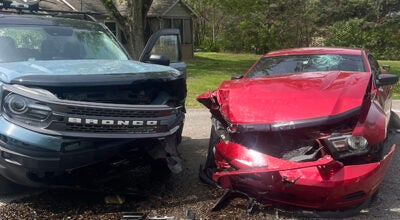At 45, Cass Family Clinic an ‘economic engine’
Published 8:26 am Wednesday, August 12, 2009

Cassopolis Family Clinic is a non-profit, community-based health center that provides comprehensive primary and preventive health care and social services to medically underserved individuals and families regardless of their ability to pay. (The Daily News/John Eby)
By JOHN EBY
Dowagiac Daily News
CASSOPOLIS – If the $462,975 in stimulus funds showered on Cassopolis Family Clinic raised any eyebrows in this village that is the Cass County seat, it was federal acknowledgement that this member of the National Association of Community Health Center represents an “economic engine.”
Between the clinic here and its obstetrical clinic by the hospital in Niles, 39 people are employed.
Combine what it pays for OB doctors and the clinic payroll and it’s a sum of $3 million a year.
“In March, we got $150,000 in an increased demand for services grant,” Executive Director Mary Geegan Middleton said Tuesday. “Community health centers are getting more and more people coming to them who are uninsured or who have Medicaid. This grant was intended to give community health centers additional money to see more patients.
“In trying to figure out what would be the best for our patients, we came up with a plan to work with Jeff Elliott (administrator of the Van Buren/Cass County District Public Health Department in Cassopolis and Hartford, who attended with Medical Director Dr. Frederick Johansen) for dental services for our patients. People who are uninsured, who have health insurance but not dental insurance and who are below 200 percent of the federal poverty level, if they have an urgent need they can be referred by us to dental offices in Hartford or (the Donald Lyons Health Center) in Dowagiac.”
The big prop check for $462,975 is for capital improvement through HRSA, the Health Resources and Services Administration.
“That can be used for technology, repairs, remodeling, construction, that type of thing,” Middleton said. “We didn’t have a plan that we could put in place to do major renovations of this clinic, but we are working on it. We decided to modernize our facility. We plan to finish painting, do some carpeting and buy some furniture that really matches. We’ve never had that before. And buy some new equipment that we desperately need, here and in Niles at our obstetrical office. We have two years to spend both of those grants. We plan to employ one fulltime maintenance man to do a lot of the work here. We’ve been doing some painting so far because the capital improvement grant money has not been released by the government. We haven’t purchased anything yet. We can’t until that money gets released. Hopefully, that will be soon. We’re really excited to modernize the facility and purchase things we’ve never had the money for.”
At a luncheon Aug. 11 celebrating its 45th anniversary (1964-2009), Middleton recalled that in 1992 it was certified as a rural health clinic kept open by Dr. Aaron Warren.
“The number of Medicare and Medicaid patients and the low reimbursements from those programs found him personally keeping the clinic open. He worked with Lakeland Regional Health System at that time because all of our patients went to the Niles hospital. Lakeland bought the clinic in 1993 and operated it as a rural health clinic until 2005. We got enhanced payments for Medicare and Medicaid patients, which helped keep the clinic open. There was still an operating loss every year” which Lakeland absorbed.
In 2005, after applying twice, the clinic was awarded Federally Qualified Health Center, or FQHC, status.
“That gave us cost reimbursement for Medicare and Medicaid, which is a little bit more money for each of those visits. Also, then, it gave us the requirement of having to provide coverage for people who have limited or no ability to pay without federal grants.”
In September 2007, “We became a member of the club, if you will,” said Middleton, a Union High School graduate who began her career in the insurance industry with Wolverine Mutual. “With full FQHC status, that meant cost reimbursement for Medicare and Medicaid. We got a federal grant to help cover the cost of providing service to the uninsured, so now we had a positive bottom line. It’s only been a couple of years, so we’re still trying to get used to the fact that our bottom line’s not red anymore. It’s not a big bottom line, but at least it’s not a negative number. We like to think we’re carrying on the tradition that started back in the 1960s when the community built this clinic because there was a need for doctors to take care of them.”
Middleton introduced 35-year veteran Dr. Neil See and three-year Dr. Lori Checkley, who grew up in Cassopolis.
“All together, we have staff with 205 years of service,” she said. “Our board of directors has 51 years of service. Mr. (Robert) Feldman, (a Niles attorney) has been on the board since 1992. Tom McCauslin was on the board for many, many years before we lost him in December. We are here to offer affordable primary care. More and more every day, we see people coming here who lost their insurance, lost their job. The first seven months of last year compared to the first seven months of this year, people who no longer have insurance are going directly to the Medicaid program or to the uninsured categories. We’ve had an incredible amount of increase to our Medicaid patient base. Part of that is attributable to Cyndi Lozada, our outreach worker, being out in the community talking about our program, going to school events and sending fliers home in backpacks … We also provide access to a lot of people from Berrien County through the county health plan, which Cass County does not have.”
Cassopolis Family Clinic has a sliding fee schedule policy for people who fall between 100 and 200 percent of federal poverty levels to determine their discount.
“The people who are most in need, who are under 100-percent of the federal poverty level, have a minimum of $20 to pay for our services,” Middleton said.
In addition to the Cassopolis site at 109 School St., on the corner of Broadway by Clisbee Park, it operates an obstetrical clinic in Niles.
“In September 2007 we opened an obstetrical practice at 60 St. Joe, across from the Niles hospital,” she said. “We did that because Southwestern Medical Clinic was no longer able to financially take care of the number of Medicaid patients seeking care at their office. With some financial assurances from Lakeland, our board of directors said that’s what we should do. Earlier this year, in April, we were successful in getting that added to our community health center project scope. We’re working now on being able to bill for those services. What we’ve tried to do is create a financially-sustainable model.”
Middleton said there were 543 babies delivered last year. “So far this year, we’ve had 349” babies born – a pace for 600 in 2009.
Southwestern doctors literally walk down the hallway to the office.
“We don’t employ them, we contract their services,” Middleton related.
“Last year we paid $1.2 million in contracted services for physicians and nurse midwives.”
In the last seven months, she apprised Cass County Board of Commissioners Chairman Ron Francis, “We’ve had about 7,500 patients, close to 9,000 with Niles. “Just for this site, we’re at about 7,500. Twenty-nine percent of that is Medicare – seniors. Thirty-three percent of all patients who come here are Medicaid. We have two commercial categories. One where we have contracts with people like Blue Cross Blue Shield and some of the bigger payers. Then there’s another portion of people who have insurance, but they’re typically considered underinsured. Their insurance might not cover office visits or pay well. That’s 6 percent. Fifteen percent are uninsured. They get a check in the mail and the phone bill is due or they need groceries, it goes for that.”






